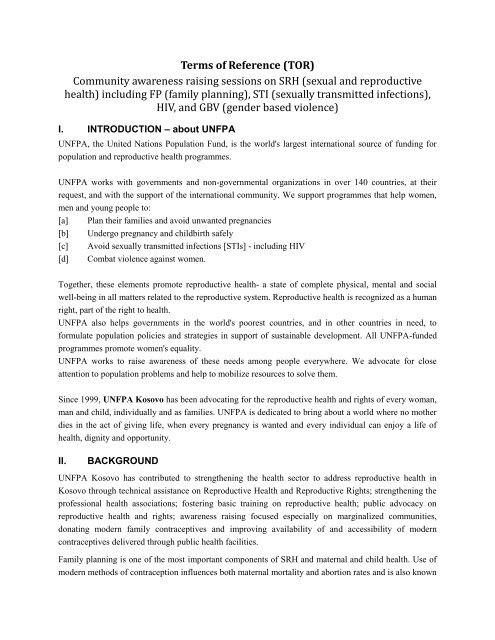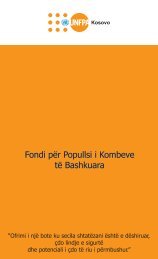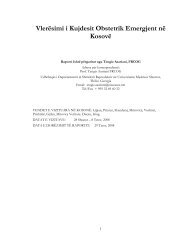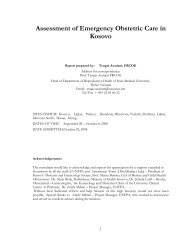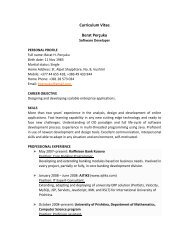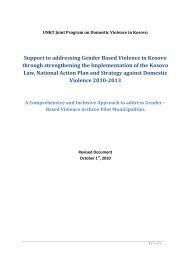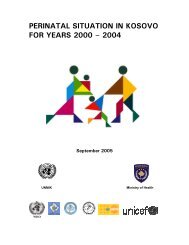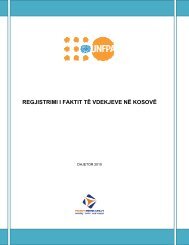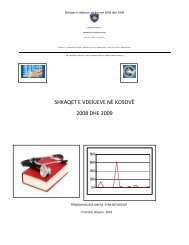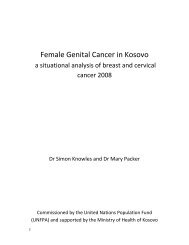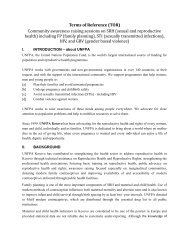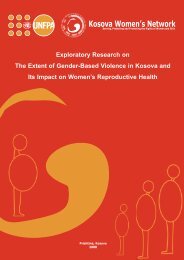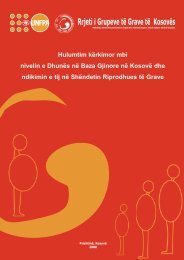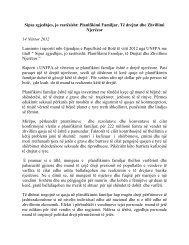Terms of Reference (TOR) Community awareness raising ... - UNFPA
Terms of Reference (TOR) Community awareness raising ... - UNFPA
Terms of Reference (TOR) Community awareness raising ... - UNFPA
Create successful ePaper yourself
Turn your PDF publications into a flip-book with our unique Google optimized e-Paper software.
<strong>Terms</strong> <strong>of</strong> <strong>Reference</strong> (<strong>TOR</strong>)<br />
<strong>Community</strong> <strong>awareness</strong> <strong>raising</strong> sessions on SRH (sexual and reproductive<br />
health) including FP (family planning), STI (sexually transmitted infections),<br />
HIV, and GBV (gender based violence)<br />
I. INTRODUCTION – about <strong>UNFPA</strong><br />
<strong>UNFPA</strong>, the United Nations Population Fund, is the world's largest international source <strong>of</strong> funding for<br />
population and reproductive health programmes.<br />
<strong>UNFPA</strong> works with governments and non-governmental organizations in over 140 countries, at their<br />
request, and with the support <strong>of</strong> the international community. We support programmes that help women,<br />
men and young people to:<br />
[a] Plan their families and avoid unwanted pregnancies<br />
[b] Undergo pregnancy and childbirth safely<br />
[c] Avoid sexually transmitted infections [STIs] - including HIV<br />
[d] Combat violence against women.<br />
Together, these elements promote reproductive health- a state <strong>of</strong> complete physical, mental and social<br />
well-being in all matters related to the reproductive system. Reproductive health is recognized as a human<br />
right, part <strong>of</strong> the right to health.<br />
<strong>UNFPA</strong> also helps governments in the world's poorest countries, and in other countries in need, to<br />
formulate population policies and strategies in support <strong>of</strong> sustainable development. All <strong>UNFPA</strong>-funded<br />
programmes promote women's equality.<br />
<strong>UNFPA</strong> works to raise <strong>awareness</strong> <strong>of</strong> these needs among people everywhere. We advocate for close<br />
attention to population problems and help to mobilize resources to solve them.<br />
Since 1999, <strong>UNFPA</strong> Kosovo has been advocating for the reproductive health and rights <strong>of</strong> every woman,<br />
man and child, individually and as families. <strong>UNFPA</strong> is dedicated to bring about a world where no mother<br />
dies in the act <strong>of</strong> giving life, when every pregnancy is wanted and every individual can enjoy a life <strong>of</strong><br />
health, dignity and opportunity.<br />
II.<br />
BACKGROUND<br />
<strong>UNFPA</strong> Kosovo has contributed to strengthening the health sector to address reproductive health in<br />
Kosovo through technical assistance on Reproductive Health and Reproductive Rights; strengthening the<br />
pr<strong>of</strong>essional health associations; fostering basic training on reproductive health; public advocacy on<br />
reproductive health and rights; <strong>awareness</strong> <strong>raising</strong> focused especially on marginalized communities,<br />
donating modern family contraceptives and improving availability <strong>of</strong> and accessibility <strong>of</strong> modern<br />
contraceptives delivered through public health facilities.<br />
Family planning is one <strong>of</strong> the most important components <strong>of</strong> SRH and maternal and child health. Use <strong>of</strong><br />
modern methods <strong>of</strong> contraception influences both maternal mortality and abortion rates and is also known
to improve infant and child survival through birth spacing by at least two–year intervals. <strong>UNFPA</strong> donated<br />
to MoH modern contraceptives, which are distributed through the essential drug list to all public<br />
institutions.<br />
Maternal and child health indicators in Kosovo are considered to be one <strong>of</strong> the poorest in Europe and<br />
provided statistical data are not reliable due to systematic under-reporting. Although the knowledge <strong>of</strong><br />
various contraceptive methods is high among all women in Kosovo (95.3%), the use <strong>of</strong> modern<br />
contraception is low and decreasing, with only 15% <strong>of</strong> married women <strong>of</strong> reproductive age using a<br />
modern contraception method; in 2003 it was 22.6 % <strong>of</strong> them. 1<br />
Although reliable information on HIV and STIs prevalence is not available, it is estimated that the<br />
incidence <strong>of</strong> HIV is still less than 1% <strong>of</strong> the population, and less than 5% among high-risk groups. The<br />
knowledge on HIV is relatively high, but poor knowledge on transmission leads to stigmatization <strong>of</strong><br />
people living with HIV. The growing numbers <strong>of</strong> intravenous drug users, the discriminated MSM<br />
community and sex workers, the changing social norms, the large mobile and migrating community and<br />
the low <strong>awareness</strong> about HIV prevention methods, have led to an increased vulnerability to HIV/AIDS<br />
and Sexually Transmitted Infections (STIs), which the weak and underfunded health sector might have<br />
difficulties to address. 2<br />
Domestic and gender-based violence are rarely discussed publicly and reported, although it is estimated<br />
that these affect women at all ages, ethnicities, marital status and geographic areas. An exploratory<br />
research on the Extent <strong>of</strong> Gender-Based Violence in Kosova estimated that the rate <strong>of</strong> domestic violence<br />
was as high as 23% in 2008. The adoption <strong>of</strong> the new Law on Protection against Domestic Violence<br />
(2010) and <strong>of</strong> Kosovo Program against Domestic Violence provides that the responsibility for addressing<br />
DV being also transferred to municipalities where mechanisms for coordination remain week.<br />
There is a lack <strong>of</strong> knowledge and <strong>awareness</strong> among communities and families about adequate home care<br />
management, child physical and cognitive development and general reproductive health. Kosovo young<br />
population lacks information on their rights or life skills such as unprotected sex, drugs, alcohol, tobacco<br />
and HIV/AIDS. Political and cultural barriers <strong>of</strong>ten prevent information and services from reaching young<br />
men and women; there is a general reluctance in families, communities and schools to discuss<br />
reproductive health and sexual behavior. Health education in the formal school system is poor and sexual<br />
and reproductive health is not taught at all.<br />
1.5 % <strong>of</strong> almost 1.8 million Kosovo population are formed by Kosovo Serbs, Turkish, Bosnian, Gorani,<br />
Roma, Ashkali, Egyptians, and other communities. Knowledge <strong>of</strong> HIV is considerably low among these<br />
minority communities. Roma, Ashkali, and Egyptian (RAE) belong to the most marginalized<br />
communities in Kosovo. They live in extreme poverty with poor nutrition and limited access to health<br />
services and health indicator among them are also considerably lower. Home deliveries with traditional<br />
birth attendants are quite common among RAE communities.<br />
1<br />
Demographic, Social and Reproductive Health survey in Kosovo (2009), Statistical Agency <strong>of</strong> Kosovo<br />
Demographic, Social and Reproductive Health survey in Kosovo (2003), Statistical Agency <strong>of</strong> Kosovo<br />
2 Human Development Report ( 2010), UNDP
Between 2007 and 2011, <strong>UNFPA</strong> in cooperation with UNICEF and WHO implemented programme<br />
“Improving Health <strong>of</strong> Women and Children in Kosovo” focusing on <strong>raising</strong> <strong>awareness</strong> in marginalized<br />
communities among others. <strong>UNFPA</strong> contributed in <strong>awareness</strong> <strong>raising</strong> in communities, especially in rural<br />
areas and in RAE communities. <strong>UNFPA</strong> supported local NGOs to implement community education<br />
courses/lectures, and outreach activities, during which a series <strong>of</strong> important issues such as SRH, family<br />
planning through the usage <strong>of</strong> modern contraceptive methods, STI/AIDS, prevention <strong>of</strong> Gender-based<br />
Violence (GBV), as well as hygiene were promoted. In total, 4059 RAE community members attended<br />
community sessions. Condoms and hygienic packages were distributed to all the participants.<br />
Monitoring visits showed that the number <strong>of</strong> RAE community members seeking for medical services had<br />
significantly increased as a consequence <strong>of</strong> information that the community gained during the health<br />
education sessions provided by trainers and volunteers <strong>of</strong> the RAE community.<br />
A RAE NGO in Fushe Kosovo has conducted a household survey regarding the current health and social<br />
situation <strong>of</strong> the community. Based on the findings, the abortion rate, deliveries at homes, STI and other<br />
diseases’ prevalence are still very high and the contraceptive usage is low. The survey showed that:<br />
62% <strong>of</strong> RAE community in Fushe Kosovo lives with social support and 92% <strong>of</strong> these told that<br />
social help does not cover their needs for health issues;<br />
60% deliveries occurred at hospital, while 38% at home, <strong>of</strong> which 9% experienced complications.<br />
54% reported that they plan their family, 49% reported that they use contraception. The most<br />
popular method is the condom (in 2008, 48.90%; in 2009, 80.40% and in 2010, 70%).<br />
III.<br />
RATIONALE<br />
<strong>UNFPA</strong> Kosovo addresses issues <strong>of</strong> maternal and child health by programme “Partnership to Improve<br />
Sexual and Reproductive Health in Kosovo” jointly implemented by <strong>UNFPA</strong>, UNICEF and WHO. The 4<br />
years lasting programme which has been initiated earlier in 2012 and funded by generosity <strong>of</strong> the<br />
government <strong>of</strong> the Grand Duchy <strong>of</strong> Luxemburg is aiming to improve evidence-based policy making in the<br />
health sector, enhance the quality <strong>of</strong> public health services, as well as raise <strong>awareness</strong> and initiative<br />
among Kosovo citizens and civil society. Programme has been implemented in close collaboration with<br />
the Ministry <strong>of</strong> Health supporting newly developed Maternal, Child, Adolescent and Reproductive Health<br />
Strategy.<br />
The <strong>UNFPA</strong> Strategic Plan 2008-1011 is the framework for all <strong>UNFPA</strong> programmes and has been<br />
extended to 2013. Global, regional and country programmes will all contribute to the achievement <strong>of</strong> the<br />
Strategic Plan results, which have been approved by the governing body <strong>of</strong> <strong>UNFPA</strong>, the Executive Board.<br />
The overall purpose <strong>of</strong> the global and regional programme (GRP) is to assure that <strong>UNFPA</strong> exercises<br />
effective global and regional leadership in providing support to countries in implementation <strong>of</strong> the ICPD<br />
Programme <strong>of</strong> Action and contributions to the achievement <strong>of</strong> the Millennium Development Goals<br />
(MDGs). The global and regional programme is linked to country operations and mutually reinforces<br />
policy, technical and programme dimensions through provision <strong>of</strong> the multi-disciplinary technical<br />
assistances, reinforcement <strong>of</strong> the policy dialogues and programming, including joint programming where<br />
viable.
“To enable and support responsible voluntary decisions about child-bearing and methods <strong>of</strong> family<br />
planning <strong>of</strong> their choice, as well as other methods <strong>of</strong> their choice for regulation <strong>of</strong> fertility which are not<br />
against the law and to have the information, education and means to do so” is one <strong>of</strong> the objectives for<br />
Sexual and reproductive health <strong>of</strong> ICDPs Programme <strong>of</strong> Action.<br />
IV.<br />
PURPOSE<br />
V. <strong>UNFPA</strong> is seeking the services <strong>of</strong> national NGO in order to carry out community<br />
<strong>awareness</strong> <strong>raising</strong> sessions on SRH/RR including FP, STI, HIV, and GBV at Municipalities <strong>of</strong><br />
Fushe Kosova and Obiliq. Providing information about these issues, availability <strong>of</strong> free services<br />
and FP commodities, will empower people to make responsible and informed choices about their<br />
health and life.<br />
VI.<br />
OBJECTIVES<br />
Activities will impact to increased empowerment <strong>of</strong> women, men and children, raised <strong>awareness</strong> on<br />
maternal and child health by contributing to outcome focusing on empowerment <strong>of</strong> women, men and<br />
children to demand, access and use quality health services , and outcome resulting in women and<br />
children/youth making more responsible choices for healthy lifestyles and their environment.<br />
It is anticipated that the projects will be implemented at community level () during the project duration,<br />
with respect to annual reporting deadlines.<br />
Project will focus on the area <strong>of</strong> Sexual and Reproductive Health and Reproductive Rights, and will<br />
include topics listed below:<br />
<br />
<br />
<br />
<br />
<strong>Community</strong> based education activities Sexual and Reproductive Health and rights, Safe<br />
Motherhood, Family planning , HIV, STI, Gender Based Violence;<br />
Promoting activities on safe sex behavior;<br />
Sessions focused on rural and vulnerable communities;<br />
Sessions should be focused on men, women, and youth.<br />
VII.<br />
Process and Methodology<br />
It is required that project will be strongly based on a holistic approach that ensures strong local<br />
relationships during the project implementation. <strong>UNFPA</strong> will monitor and supervise the activities<br />
undertaken by the Contractor and will provide guidelines and orientation according to project objectives<br />
in line with <strong>UNFPA</strong> rules and regulations.<br />
Other responsibilities <strong>of</strong> the contractor are:<br />
<br />
The Contractor should make pictures or record <strong>of</strong> every activity, as well as <strong>of</strong> important meetings<br />
with beneficiaries <strong>of</strong> the project;
VIII.<br />
<br />
<br />
<br />
<br />
<br />
<br />
<br />
<br />
IX.<br />
The Contractor should provide a consolidated report on activities (focus group meetings,<br />
trainings, materials used, recommendations and suggestions on best training approaches,<br />
<strong>awareness</strong> activities, IEC/BCC interventions);<br />
The Contractor is responsible for keeping active and regular communication with <strong>UNFPA</strong> RH<br />
Coordinator;<br />
The Contractor is responsible for satisfactory delivery <strong>of</strong> the services as described under these<br />
ToRs.<br />
Deliverables<br />
Detailed project proposal<br />
Quarterly narrative and financial reports on activities;<br />
Specific activity plan in advance (For the purpose <strong>of</strong> monitoring);<br />
Methodology for community based sessions within chosen community/communities;<br />
Methodology for community based sessions within chosen community/communities;<br />
Data base for participants;<br />
First draft <strong>of</strong> Standard Project report on Activities including any IEC/BCC materials produced<br />
and distributed no later than 25 th November <strong>of</strong> respective year;<br />
Final report;<br />
Project Duration: One year initially, with possibility <strong>of</strong> extension;<br />
X. Resource Requirements<br />
The National NGO is encouraged to ensure a nation-wide coverage, with focused on Country<br />
Development Programme, target municipalities and community work. The NGO’s should have<br />
experience <strong>of</strong> at least 5 years working with communities with focus on SRH, Advocacy and Awareness<br />
<strong>raising</strong>.<br />
The qualification background <strong>of</strong> the NGO’s should be in the areas <strong>of</strong>: Education, <strong>Community</strong> work,<br />
Marginalized communities, Youth; Vulnerable and Marginalized Youth; Advocacy and Awareness on<br />
SRH and ASRH<br />
The NGO’s are expected to have:<br />
General pr<strong>of</strong>essional experience<br />
<br />
<br />
<br />
<br />
<br />
High level <strong>of</strong> expertise in: <strong>Community</strong> work with Rural, Vulnerable and Marginalized<br />
Communities, Advocacy and Awareness <strong>raising</strong> activities on SRH;<br />
Excellent knowledge and significant skills in prevention and response using relevant experience<br />
for developing training and capacity building programmes in developing countries with focus on<br />
communities, especially the vulnerable ones;<br />
Skills in running community sessions/trainings on SRH/RR;<br />
Proven training and /or educational skills;<br />
Previous UN working experience is an asset.


